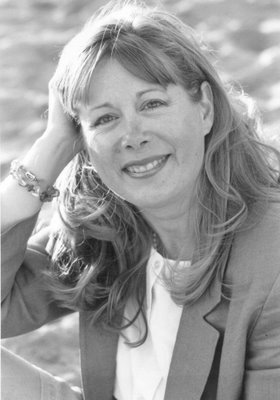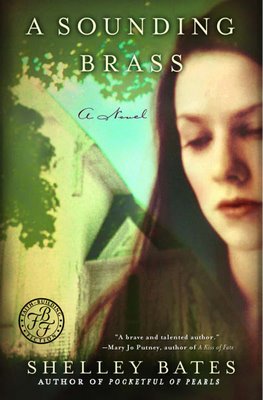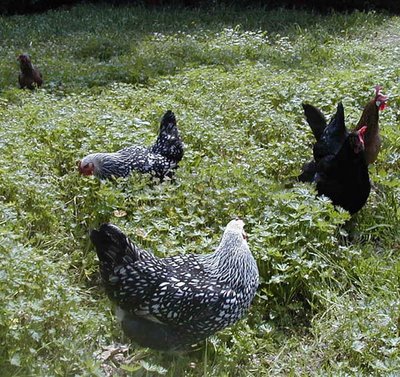 Today we have the edgy, the wonderful, the magnificent chicken-raising author, Shelley Bates. (Yes, chickens. We’ll come back to that.) Shelley has a B.A. in Creative Writing from the University of California at Santa Cruz and an M.A. in Writing Popular Fiction from Seton Hill University in Pennsylvania. She sold her master's thesis to Harlequin after she graduated in 2002, and it subsequently became a double finalist in the 2004 National Readers Choice Awards.
Today we have the edgy, the wonderful, the magnificent chicken-raising author, Shelley Bates. (Yes, chickens. We’ll come back to that.) Shelley has a B.A. in Creative Writing from the University of California at Santa Cruz and an M.A. in Writing Popular Fiction from Seton Hill University in Pennsylvania. She sold her master's thesis to Harlequin after she graduated in 2002, and it subsequently became a double finalist in the 2004 National Readers Choice Awards.Grounds to Believe, her debut novel from Steeple Hill Books and the first book in her Elect Trilogy, won the 2005 RITA Award for Best Inspirational Novel of the Year from the Romance Writers of America. The second book in the trilogy, Pocketful of Pearls, is a 2006 RITA Award finalist, and the last book, A Sounding Brass, has just been released by FaithWords (formerly Warner Faith).
DM: Shelley, thank you so much for being here. You’ve earned the title of “edgy” with your books. Can you tell us why and what that means for your books?
SB: Publisher’s Weekly started it by classifying me with a few other books under a headline of “Faith on the Edge.” So hey, who am I to argue? I think we call something “edgy” if it’s on a subject we’ve been conditioned not to talk openly about. I talk about the toxic church, which can be controversial and painfully personal for many people.
DM: Your books have deep issues that really pull readers in and make them think. Do you write with that goal in mind or does it organically occur as you begin to plan your stories?
SB: That’s me—a deep thinker. Not! My books come out of my own experience, which led to a lot of soul searching and to very personal conversations and interviews with people. The central theme I write about always involves a woman breaking out of structures that other people have imposed on her. I think it’s a theme that many women deal with in their day-to-day lives, and many don’t know how to change the thinking that keeps them in the cage. The characters in my books illustrate what happens—for good or ill—when you try to escape the structures made of rules and focus solely on your relationship with God.
DM: You openly share your experience with a “toxic” church and even brought this issue into your books. How has this past experience affected your writing and your stories? Do you feel God has put you in this time and place to help others see the difference between a healthy church and a toxic church?
SB: I think He must have. I’m getting opportunities and honors that would never have happened if God hadn’t been in on it.
DM: What’s your secret to keeping a balanced writing life?
SB: I used to manage time for a living as an executive assistant to a busy VP, so I’m used to parceling out my day in chunks. This chunk goes to e-mail and promotion, this one to the day job, this chunk is sacred to writing, this chunk goes to having a cold drink and playing with the chickens. However, there’s a difference between being able to portion out chunks and actually getting tangible work done in them. I’m still working on that part. But I guard my writing time fiercely. I think we have to value our time—it’s an indication of how much we value our work.
DM: What comes first for you, the story or the characters?
SB: My books always seem to start with an image—like a picture or a still shot from a movie—that becomes the opening scene. It has people and objects and buildings in it, and I have to figure out why they’re there, who they are, and what they’re going to do about it. For instance, Pocketful of Pearls began with the image of a woman confronting a homeless man on the back porch of her house. It was dark, lit by a bare lightbulb overhead, and the house was full of people. I learned that the people were there for the funeral of her father, and the homeless man turned out to be the hero who saves the heroine’s life in more ways than one. But it all began with that one dark image.
DM: How do you develop your characters?
SB: Uh … I guess “I don’t know” isn’t the answer you’re looking for, is it? They seem like memories of people I know, if that makes sense. I usually give them a central characteristic (for instance, in A Sounding Brass she’s a big-city girl born and raised in a small town, he’s a smart-mouth cop) and then work inward and outward from there. How would his dialogue sound if he’s always quipping and fencing with people verbally? How would she relate to people around her if she feels they’re trapping her in the town? Stuff like that.
 DM: A Sounding Brass is the third book in the Elect Trilogy. How did this story come about?
DM: A Sounding Brass is the third book in the Elect Trilogy. How did this story come about?SB: Like Pocketful of Pearls, it’s based on true events (believe me, you can’t make this stuff up). A radio evangelist came to the town my cousins live in, and during the course of his "ministry," managed to defraud the entire town to the tune of hundreds of thousands of dollars. I cut that article out of the paper right away, because the pricking of my thumbs told me it would make a great basis for a story.
DM: What kind of research did you have to do?
SB: I spent an evening at 91.5 KKUP here in Santa Clara, which is a small independent radio station that I basically lifted in its entirety and put in my fictional town of Hamilton Falls—right down to the coffee pot. The DJ (Jackie, who hosts the Thursday night bluegrass and folk show) showed me how all the decks and players worked, how the sound mixer worked, and let me take pictures and make diagrams. Then I took the station manager to dinner, and she told me how you would launder money through the station. It was great.
DM: OK, I’ve made everyone wait long enough. Tell us about your chickens. How did you wind up having chickens for pets?
SB: This bird walked into my yard one day … No, really. She did. She walked in and announced she was staying, so my dh built her a coop. That was Electroclux, an Isa Brown. And since chickens are flock birds, she was getting depressed without a companion, so I went to the animal shelter and saw this forlorn little bird sitting in a cage with its wings all droopy, going, “I hate my life.” So of course I took her. That was Cocoa Puff, an Ameraucana. Then a clerk at Gene’s Fine Foods brought me a hen in a box who had been living on their refuse pile. That was Genie, a Black Australorp. Then some folks down the road said they were moving and could I take their birds … That was Schatzi, Penny, and Blue, all Ameraucanas who lay blue and green eggs. Currently I have eight, including the Peepers, who are lovely Golden Comet pullets. They know their individual names (Dinah and JoJo) but they’ll come as a pair (Peepers) when you call them, too.

Chickens are smart. They have the intellect of an 18-month-old human, so they can learn language. Mine know about a dozen English phrases, and they all know and respond to their names. They’re very affectionate, too. When I got back from the Faith-Building Fiction book tour last month, I couldn’t sit down without a bird being on my lap and one on each shoulder. They just wanted to let me know they’d missed me and were glad I hadn’t been eaten by a predator. They make great pets, and the eggs are a fringe benefit. If you open yourself to chickens, they will come.
DM: Shelley, thank you so much for sharing yourself and your wonderful books with us. I love your stories.
SB: Thanks, Dineen—I always appreciate an opportunity to talk books and birds!
Be sure to check out Shelley’s fabulous website, too, for more information about her books and her chickens! Leave a comment for a chance to win a signed copy of Shelley’s latest book, A Sounding Brass.

9 comments:
"Electroclux"! Love it! I remember Schatzi, LOL I loved Pocketful of Pearls, too. Wonderful, wonderful story. Reminds me of some history I read and shared with some dear young people who often knocked on my door, God bless'em all. Having read Walter Martin, I was the Holy Spirit Spider to the unsuspecting little flies. : )
I loved the chickens' names, and I never knew they were affectionate! I used to love to see the chickens at county fairs. They're really beautiful birds. Hmm ... I wonder what my homeowners association would say ... LOL
But if we ever move to the mountians ... :o)
Thanks for the interview Shelley and Dineen! I absolutely love Shelley's books! I have read the first 2 in the triology and have Sounding Brass on order. We need more edgy Christian fiction out there. Plus, I'm going to look at Chickens in a whole new light! Don't know if I can eat chicken again!
Thanks Dineen and Shelley for a great interview! Chickens for pets - I never would have thought. :-) Shelley, I bought "Grounds to Believe" when it first came out through Steeple Hill. Are your other books published by that company? I haven't seen them and I wish I had known that it was a series. Now I'm just going to have to buy the others! :-) I can't have an incomplete series sitting on my bookshelves now, can I? At least that's what I'm telling my husband! LOL!
Blessings,
Shauna
Edgy fiction and chickens in the same interview. Talk about breadth! Great interview, gals! Kinda makes me want to look into getting chickens. :) And definitely look into getting Shelley's books.
Thanks for stopping by, everyone! Shauna, in answer to your question, the last two books in the trilogy were published by Warner Faith. You can still find them in Christian bookstores, or on ChristianBook.com. And thank you :)
Shelley B.
http://www.shelleybates.com
great interview, Dineen! (as always!)
Dineen,
What a great interview. Thank you. I want to read the books. They sound like wonderful stories!! Be blessed! Lynn :)
Oh, I just loved reading the first book. The story was just intoxicating to me. :-D Enter me, Neen, in the drawing.
Loved the chickens names and their story about how they found their home. :-D
Post a Comment